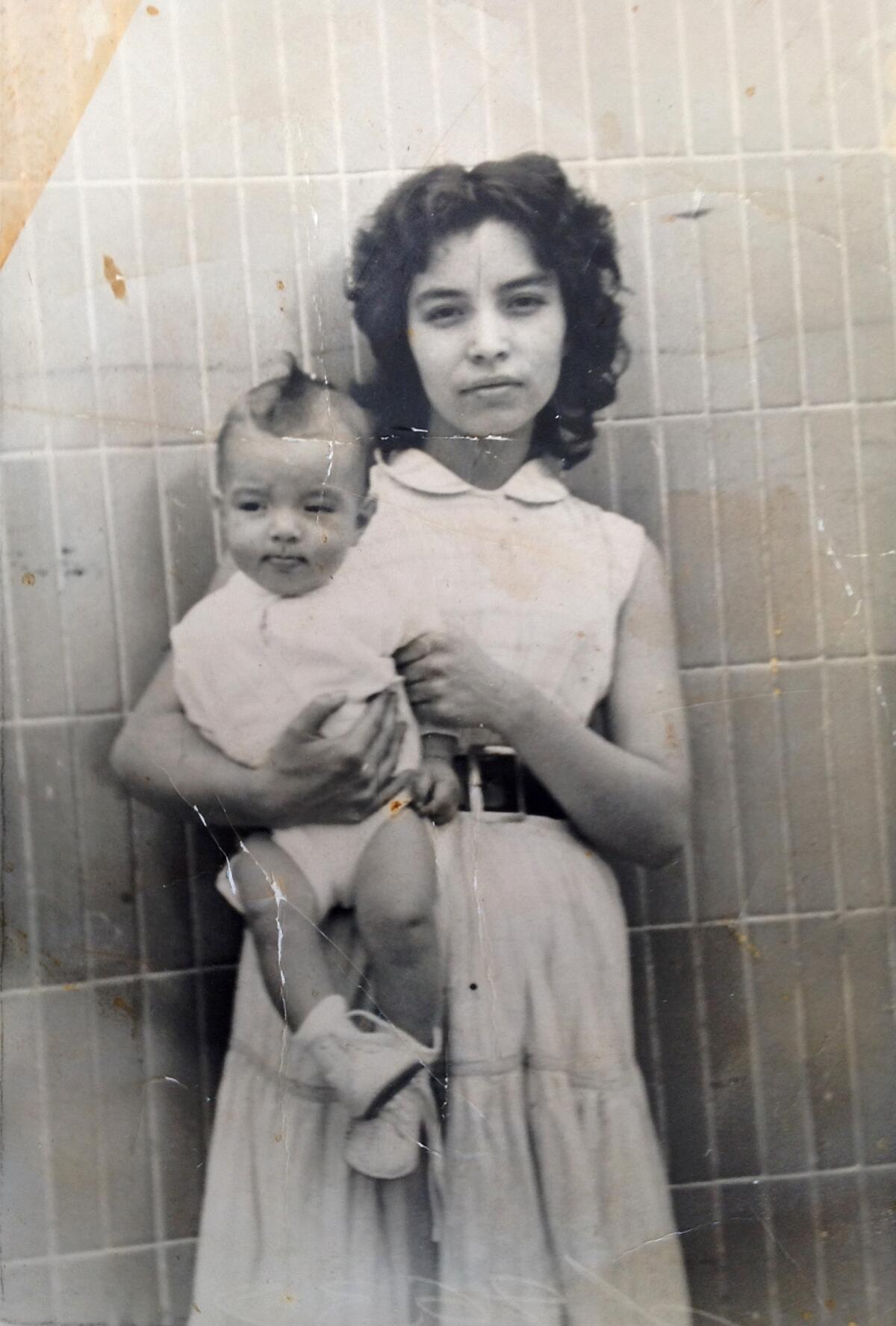Column: For years, I Anglicized my Mexican last name. MAGA trolls inspired me to reclaim it

- Share via
As a child, I learned to mangle my last name: Guerrero. Spanish for warrior. A mouthquake of a name, it mobilizes the tongue’s full range — from its genesis near the gullet to the rolled “rr,” a windstorm by the teeth. My teachers compressed its three syllables to two, without vibration: “greh-roh.”
Groan instead of battle cry.
I didn’t mind. Like most girls in the 1990s, I was cultured to self-constrict. The early Disney Princesses, my introduction to American feminine ideals, were dainty and demure. My gale-force name and nature, I understood, needed taming. And like many children whose parents came from places denigrated as “Third World,” I studied U.S. films for cues on fitting in. I identified with the mermaid Ariel, willing to surrender her voice to be “part of that world.”
My father, from Mexico, and my mother, from Puerto Rico, spoke to me in Spanish, my first language. We lived in San Diego during a decade of anti-Mexican hate in California, stoked by right-wing radio hosts and politicians like then-Gov. Pete Wilson. We often crossed the border to Tijuana for leisure. But then my father — who had once built ships for a living — became depressed and disappeared for a time. We mostly stopped visiting Mexico.
Opinion Columnist
Jean Guerrero
Jean Guerrero is the author, most recently, of “Hatemonger: Stephen Miller, Donald Trump and the White Nationalist Agenda.”
My mother had become a physician by enlisting in the National Health Service Corps, which funded her medical school in Puerto Rico in exchange for mainland service. She put me and my sister in a private Episcopalian school: pricey but a priority for her. There, the majority-white teachers forbade students — mostly children of immigrants — from speaking Spanish. If caught, we had to write “I will not speak Spanish” 100 times in detention.
Anxious to show my harried mother that her sacrifices were paying off, I worked hard to please the teachers. I largely stopped using my native language, which I saw as delinquent.
I became Jean “greh-roh.” My first name, “Jean,” was already in English — from my mother’s “Jeannette,” a product of colonial U.S. policies in Puerto Rico that mandated English and cast it as superior to Spanish. As English supplanted my Spanish, I felt increasingly isolated from family, including my paternal Abuelita, who’d filled the hole my father left in my life. She couldn’t speak English, so our conversations became shallow and strained. I grew distant even from my sister, my best friend; she embraced a gothic chola identity in middle school because unlike me, she couldn’t pass as white.

As one of the most gringa-looking members of my family, I had the luxury of persuading white people to give me a seat at the table. But this came with a cost. I became dissociated, split into warring parts. When I entered a mostly white private high school in a wealthy enclave of north San Diego, commuting an hour daily, the dissociation deepened. I binge drank and cut my wrists. I fought with my mother, monstrously pointing out when she made a mistake in English. (“Learn English!” I cried, weaponizing the education she was exhausting herself for me to have.)
The author Reyna Grande, from Mexico, describes a similar deterioration in her relationship with herself and her mother as she assimilated. It started, she wrote, with “subtractive bilingualism, the removal of my mother tongue, the psychological violence of tearing out a piece of my being.” She then took on the dominant culture’s disdain for her mother. “When our relationship to our mother tongue is compromised, so, too, is our self-image and our most natural way of interacting with the world,” she wrote.
Research shows weak ethnic identity is tied to worse mental health among Latinos and other people of color, including increased risk of suicide and substance abuse. Yet, it’s commonly forced on kids, partly through “the renaming, denaming and misnaming of students from linguistically marginalized and ethnoracially minoritized backgrounds,” writes Mary Bucholtz, a linguistics professor at UC Santa Barbara.
It’s a timeworn tool of white supremacy. Anglo Protestant colonizers often robbed Native Americans and African Americans of their names. Later, English-language supremacists led many states, including California, to make English their official language. It became a requirement for citizenship. “The general promotion of English was rationalized to secure Anglo ‘American’ identity dominance, used to develop and maintain white privilege,” according to Reynaldo Macías, a UCLA professor of linguistics.
If the robbery of names has served racial subjugation, could reclaiming them reverse it? While the anti-Mexican, anti-Muslim, anti-China demagogue is no longer president, his white nationalist party continues its assault on nonwhite communities. As small acts of resistance, more people from scapegoated groups are reverting to original pronunciations of their names, using their complete names and otherwise reclaiming altered names.
It’s a way of asserting “pride in one’s culture,” Carmen Fought, a Pitzer College linguistics professor, told me. “A single word can connect you to a whole culture and a whole heritage. It can connect you to another person in a way that’s very unique and special.”

In her new book “You Sound Like a White Girl,” the Mexican American writer Julissa Natzely Arce Raya writes of reclaiming her Indigenous middle name, Natzely. In “For Brown Girls With Sharp Edges and Tender Hearts,” the Nicaraguan American author Prisca Dorcas Mojica Rodríguez explains embracing her middle and mother’s maiden name, a Latin American custom. She wrote a letter to her future husband, a white man: “I expect you to at least hold my name, my entire name, with the same protection and care that has always been given to you due to the color of your skin.”
The recent rise in anti-Asian hate crimes has compelled similar acts of reclamation among Asian Americans. “I’ve never corrected how English speakers pronounce my last name, and further concealed my identity by introducing myself as the Anglicized ‘loo,’” wrote Marian Chia-Ming Liu, a Chinese American editor at the Washington Post. “It’s actually pronounced ‘LEE-ō’ (柳) and means ‘willow tree.’ My mom’s maiden name is Ling (林), meaning ‘forest,’ and together with my dad’s last name they represent a beautiful partnership.”
People are reclaiming their names in classrooms, on social media and among friends. Shubham Gupta, a UCLA senior from India, told me he adopted an Anglicized nickname, “Shubs,” in his first year at college because he wanted to belong. But it wasn’t true to him. He wrote a Facebook post reintroducing himself: “Shubham. That’s me. Not Shubs, not Sha-bomb.” He broke down its pronunciation, explaining that it’s like a cut-off “shoo” plus “bham,” which has an exhale at the “b” and rhymes with “hum.”
What if instead of seeing it as a burden when people teach us how to say their non-Anglo names, we saw it as a gift? Research shows multilingualism defends against dementia and improves brain function. Most humans on Earth speak multiple languages. The American idea that multilingualism is bad or oppressive reflects a desire to restrict who can belong here. We can change the conversation by normalizing diverse languages.
And maybe we can destabilize the structures of white supremacy by saying our names. Our names are more than just words; they can forge a more inclusive future.
Reclaiming mine has been a slow process of finding courage by reading and listening to a chorus of multilingual voices, such as Luis Alberto Urrea’s “The Devil’s Highway,” a Spanglish-rich 2008 book about 26 Mexicans who died crossing the militarized border. It showed me that the voices of people like my parents could be made into art, and inspired me to become a journalist in Mexico, where I lived for four years after college.
There, I pronounced my last name correctly for the first time in years. I reconnected with my father and eventually wrote a book about him. As my Spanish fluency returned, I became closer to my Abuelita. While I’d long associated my last name with my father’s stepfather, a butcher who physically abused Abuelita, now it made me feel roped to her, my lifeboat — together with her burdens and traumas.
- Share via
Watch L.A. Times Today at 7 p.m. on Spectrum News 1 on Channel 1 or live stream on the Spectrum News App. Palos Verdes Peninsula and Orange County viewers can watch on Cox Systems on channel 99.
I moved back to San Diego to be close to family and got a job covering immigration for public radio and TV. Signing off from broadcast reports, I considered saying my last name in Spanish. But I worried my white bosses would see it as provocative. I was one of the newsroom’s only Latinas. In her memoir “Once I Was You,” Maria Hinojosa recalls pondering whether to say her name in Spanish or English when starting at NPR. She chose Spanish because it reflected her “authentic self.”
But what was my authentic self? I’d said “greh-roh” most of my life in the U.S. I chose the Anglicized pronunciation and gave it little thought; within months, Donald Trump ran for president and won. Reporting on the consequences of his sadistic policies left little time or space for me to reflect on how I was saying my name.
After writing a biography of his senior advisor Stephen Miller, I became the subject of attack and ridicule on Fox News and other right-wing media. Hate flooded my inbox. “If you dont like my country get the f— back to mexico you mexi-c— bitch” is just one example. There were many more.
This flood of hate triggered in me a swelling Mexi-Rican pride. I wanted, suddenly, to say my name correctly — to cause the people snarling at me to shrivel at the sound: “Guerrero.” A recent L.A. Times Today report became the first time I pronounced my last name in Spanish on the air.
Saying my name requires code switching — and it’s in the code switch that I’ve found my center. But I don’t believe everyone has to reclaim their name or that those who do must do so exclusively.
As the UCLA anthropologist Norma Mendoza-Denton pointed out to me: “For a lot of people there’s intergenerational trauma in not having access to their ancestral language or ancestral customs.” There are many valid and powerful ways of showing cultural pride.
The beauty is in the fluidity. Ilan Stavans, author of “Spanglish,” points out that the hybrid language of Spanglish, which embodies that flux, is entering the mainstream, as in the movies “Coco” and “Encanto.”
Yet, there’s also resistance. “The nativists in Spanish are worried that Spanish is being contaminated by English, and nativists in English are thinking English is being contaminated by Spanish,” Stavans told me. “What is really advancing is the in-between that shows us how language works. Language does not have borders. The English language in America is full of remnants of ‘outsiders’ who have left as an imprint their words in our linguistic reservoir.”
The purists can’t fathom the splendor, which they’d like to smother. But who really prefers a melting pot to a metamorphosing mosaic?
Recently, I came across some lines by Assétou Xango: “I want a name like fire / like rebellion … A name Donald Trump might choke on.”
I know my name is one such name. And the more I say it, the more I recognize that I’m American, not despite it, but because of it.
More to Read
A cure for the common opinion
Get thought-provoking perspectives with our weekly newsletter.
You may occasionally receive promotional content from the Los Angeles Times.














